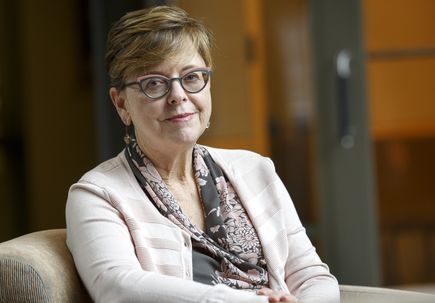Becoming a mother in the mid-1980’s was an exciting time for Dr. Nancy Haigwood. But the time also highlighted a huge health crisis—infants born HIV positive from mothers who knowingly or unknowingly carried the virus.
A scientist with a PhD in Microbiology and Immunology from the University of North Carolina, Chapel Hill, Haigwood became determined to create a vaccine or find antibodies that would prevent the transmission of HIV-AIDS from mothers to infants during birth or through breast-feeding.
Thirty-five years later, she, fellow colleagues, and scientists halfway across the world may be close to a breakthrough, thanks to research conducted at the Haigwood Lab in Portland, Oregon, where Dr. Haigwood resides as a professor at Oregon Health & Science University and is the director of the Oregon National Primate Research Center (NPRC).

Monkeys play outside within the confines of the National Primate Research Center in Portland, Oregon.
(Courtesy: OHSU)
Dr. Haigwood says NPRC collaborates with scientists and organizations that create the antibodies as clinical products. Haigwood and her team will test antibodies on primates and publish their results with the other researchers.
According to Haigwood, the current model shows a baby monkey given specific HIV antibodies forty-eight hours after being exposed to the virus becomes clear—with no trace of HIV in their systems. “In practical terms, an HIV positive mother living in poor areas of the world where medical care is not as accessible, could give birth at home. As long as she gets to a clinic between forty-eight and seventy-two hours, we could potentially completely clear the infant from becoming permanently infected with the virus. That’s if this drug therapy works in humans, the same way it works in monkeys,” she explains.
This type of treatment is currently being tested in clinical trials in Africa. Scientists are also working on a similar antibody protocol that would protect infants from getting HIV through breast milk. “It’s encouraging to hear about the trials using real world products. I'm very excited,” Haigwood says.
There are seven National Primate Research Centers (NPRC’s) across the US. The organizations are supported by the National Institute of Health (NIH). According to Haigwood, the NPRC’s primary purpose is to breed animals for research, develop models for human diseases, and provide those models and scientific expertise to anyone who has a NIH grant to conduct their research which is done in collaboration with NPRC scientists on site. “All of us who work in primate models have the goal of helping human medicine move faster,” Dr. Haigwood states.
Named as the Director of the Oregon NPRC in 2007, Haigwood says the campus includes fifty scientific investigators and close to 5,000 primates, in addition to a host of veterinarians, animal care workers, and administrative staff.
According to Haigwood, the Oregon NPRC covers five areas of biomedical research: genetics, cardio metabolic health, neuroscience, reproductive and developmental health, and infectious diseases. Recently, scientists worked on an experimental device that would offer a new way to deliver COVID-19 antibodies into humans. “We're trying some novel ways of using monoclonal antibodies that may block or prevent the virus from reproducing in human cells. One of those is delivering the antibodies through an aerosol apparatus,” Haigwood explains. “We're very excited because that will be far easier than an intravenous administration, which is how antibodies are currently being delivered in clinics.”
Outside the lab, she was a volunteer board member for the Cascade AIDS Project. In 2017, she won the Cascade AIDS Project Action Award for her "outstanding volunteer service to this AIDS service organization.”
That same year, Dr. Haigwood also became a member of ARCS Oregon Chapter. A strong proponent of science education and outreach, Haigwood says she fit right in with the organization. “We want young scientists to succeed and have an easier time in school so they can be successful scientists. And we’re working to educate chapter members and people about science and how it works.”
Dr. Haigwood said that scientific education included taking Oregon Chapter Members and guests of ARCS All Member Conference on a tour through the National Primate Research Center in 2019.

